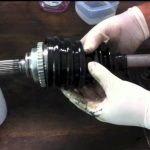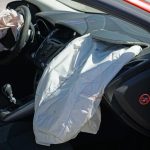
A totaled car is any car that can be described as “total loss” after a collision or severe accident. It also means the car is damaged beyond repair or the cost of repair is far greater than the car’s current value.
After a car has been declared totaled, the insurance might pay you a fair value price while you forfeit ownership the ownership of the car. However, what happens to the license plates when a car is totaled?
When a car is totaled and the insurance takes possession of the car, you can remove and retain the license plate if you want or transfer the license plate to a different vehicle.
What Happens to the License Plates When a Car is Totaled?
When a car is declared a total loss by the insurance company and you agree to the terms, you are allowed to take away your personal items and license plate because in most cases, the car will be sold parts by parts.
For example, in new York, after an accident and your car has been declared a total loss, you’ll be required to take away the license plate from the vehicle, while you surrender the title to the insurance company.
You will be required to fill out the necessary papers and send over the license plates to the DMV by handing it over yourself at your local DMV or mailing it over to them. You are also required to notify the DMV if your car is totaled.
Every state has their rules to a totaled car, but in most cases, you are allowed to remove your license plate and transfer it to be used with another vehicle.
What to Do When Your Car is Totaled and You Still Owe Money?
You definitely don’t want to be the car owner who has relinquished his right to the car and still have outstanding loans to pay. So, what should you do?
The first thing you want to consider is the value of your car and the insurer settlement offer. Insurers will only pay a current market worth of the car with regards to the level of damage it incurred during the accident.
They are not obligated to cover up all of your loans. So, you definitely want to get this process right. Here are a few instructions you can consider adopting;
1. Knowing What Makes Your Car Valuable
Your insurer will set a value for the car based on the damage it incurred with respect to the accident. It is no news that car’s depreciate in value from the day it was bought. Even if it undergoes a consistent maintenance, it still doesn’t prevent its value from depreciating.
The insurer will check the vehicle history of the car like the repairs done, the maintenance done on it, the mileage, the tires and everything worth checking. This information helps them to give a calculated value to include in the settlement offer.
One of the things you also want to know is to find out the ACV (Actual cash value) of your car as at when the accident happened. If you know this, you would be able to negotiate better.
2. Knowing How Much You Owe
After knowing the ACV of your car, you also want to know how much you owe, so you can negotiate better in order to cover up for the leftovers.
Remember your insurer will only pay your ACV which in many cases won’t be enough to cover up what you owe.
3. Reach Out To Your Insurance Company
Since you now have an insight to how the value is being calculated, the next move is to reach out to your insurance company.
After you must have taken away your personal belongings from the car and your license plate, you should give your insurance company a call.
4. Check The Offer Given If It Suits You Desire
As stated earlier, a totaled car doesn’t mean it’s totally destroyed. If the offer from the insurer isn’t looking so great, you can submit a counteroffer with enough evidence to support your claims. You can be lucky to get a better offer.
If you’re still not comfortable and you have your counteroffer with evidence, you can sue the insurance company in the civil court. Remember you would need the gap insurance funds to settle up your loan. Hopefully it’s enough.
Also, you can be lucky someone who is insured was the cause of the accident; the insurance company for the car might add a few dollars which after everything might cover your loan or may not.
What Happens When Your Car is Totaled But Still Drivable?
If a car is totaled but still drivable, you can decide to retain the ownership of the car and take a reduced payout from insurance.
However, depending on the nature of the accident, you will need to take the car to a body shop and will definitely spend more than its market value to get it fixed.
There is a reason why the car has been declared a total loss. The fact that its still drivable doesn’t mean its not totaled. The decision is left for you to make, but what is worth, you will definitely spend more than the car’s market value in repairs.
Also, if a car is declared a total loss by an insurance company but its still drivable, the insurance will sell the car as salvage to someone who will buy the car at auction to repair or to break for spares.
Moreover, even if you succeed in repairing the car, it would still need a certificate of roadworthiness after the repairs.
If the car is too badly damaged to be safely repaired but still drivable, the insurance will sell it directly to a scrapyard with strict instructions that the car should be destroyed
Who Gets the Insurance Check When a Car is Totaled Progressive?
The insurance settlement is based on if the totaled car is on a loan or not. Here are a few details on how the payment can be made once you have arrived at a conclusion.
- No Vehicle Loan: If you bought the car without a loan, you get the insurance pay check when your car is declared a total loss.
- A Vehicle Loan Is Involved: If a vehicle loan is involved, the insurance company will have to send the settlement to pay up your loan to the company involved and if the ACV you are paid isn’t enough to settle up what you owe, the insurance company will write you a check to balance up.
Conclusion
A totaled car doesn’t mean it is all lost and can’t be repaired but in most cases, the insurer declares it a totaled vehicle and gives you a settlement offer. Your settlement offer is likely not enough to cover up your loan if you have one, but be sure to get a best offer.









